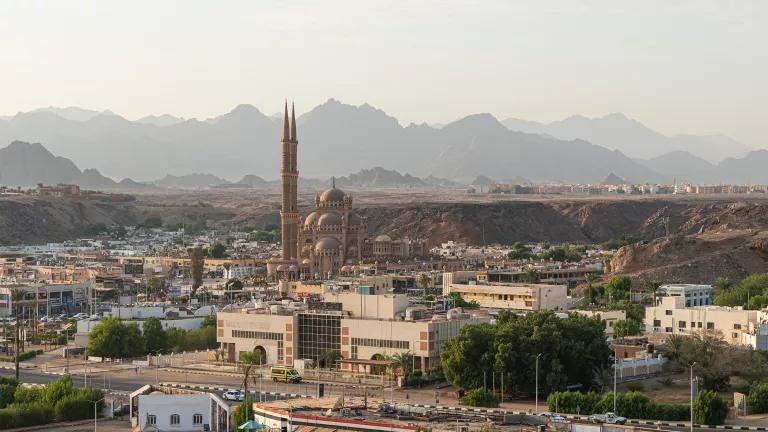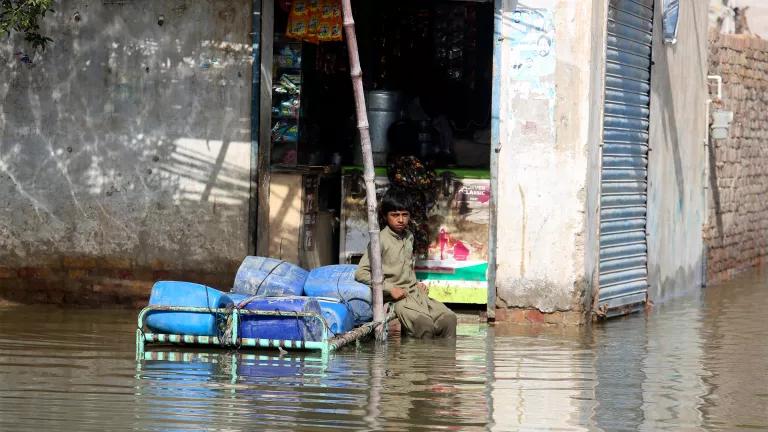NRDC Experts and Events at COP26
NRDC joins the United Nations global climate talks to hold global warming to 1.5 degrees Celsius, drive commitments to green finance, and promote nature-based solutions.
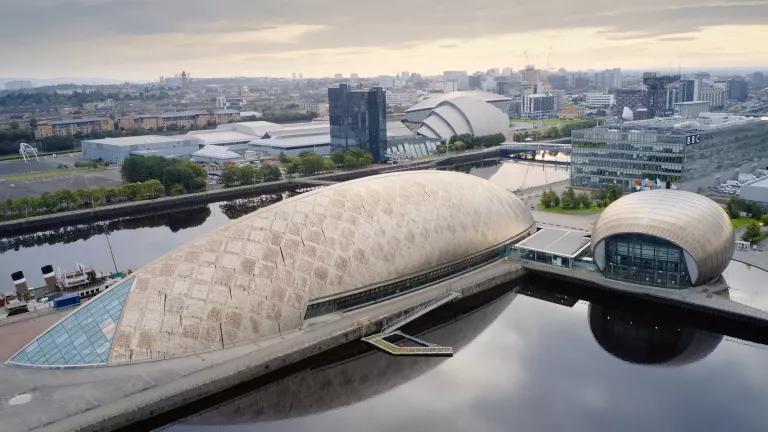
The Scottish Event Campus in Glasgow, home of COP26
COP26, taking place October 31 through November 12, 2021, marks the five-year litmus test outlined in the Paris Agreement for countries to strengthen their national targets. Leaders everywhere—presidents, governors, mayors, CEOs, and civil society leaders—must use this time to chart a collective path toward reducing greenhouse gas emissions to net-zero by 2050 and building greater resilience to the most dangerous impacts of climate change, impacts that are already here and exacerbating the challenges of the COVID-19 pandemic.
Time is of the essence. We must take decisive action, and we must do so within a global framework that protects society’s most vulnerable, invests in clean energy solutions and green workforces, conserves biodiversity, and respects the leadership of Indigenous communities.
For many years, NRDC’s international experts have participated in the United Nations global climate talks. This year, we sponsored and spoke at a number of events.
You can learn more about some of these events and watch the recordings below.
Hybrid event
The world finds itself amid a “code red” climate emergency while it tries to recover from the negative effects of the COVID-19 pandemic. As a result, we must now tackle both problems simultaneously. This is a difficult task. Nevertheless, the situation also offers an opportunity for different stakeholders in the development ecosystem to take a step beyond and come together to synchronise efforts to challenge business-as-usual approaches through new partnerships and innovative, resilient, and just solutions.
At this COP26 event, participants from different backgrounds shared their views and insights on the pipeline of 13,000 renewable energy projects that have been identified around the world earlier in 2021 and how securing their finance can enable access to sustainable and affordable energy. Participants also shared their direct experiences and provided examples on how the financing of renewables through proper channels can kick-start an inclusive and green post-COVID recovery.
This global pipeline of projects is large enough to carry out an ambitious green recovery and unlock massive private investments to multiply the effect of government stimulus spending ($60 billion recurring GDP impact). Expected results include:
- Avoiding 2.5 gigatonnes of CO2 equivalent (GtCO2e)
- 1 terawatt (TW) of renewable generation capacity
- $1.9 trillion investment opportunities
- The creation of up to 10 million jobs, both locally and in the supply chain
November 2, 2021
10:30 a.m. UTC/6:30 a.m. ET
Online and in Glasgow at the SDG7 Pavilion
Sponsors
- NRDC
- Climate Strategy & Partners
- European Climate Foundation (ECF)
Speakers
- Rebecca Collyer, director for International Energy, European Climate Foundation
- Peter Sweatman (moderator) founder and chief executive, Climate Strategy & Partners
- Teddy Mugabo, CEO, Rwanda Green Fund (FONERWA)
- Upendra Tripathy, global advisor for climate and clean energy, NRDC; former and founding director-general, International Solar Alliance (2017-2021)
- Benigno López Benítez, vice president of Sectors and Knowledge, Inter-American Development Bank (IDB)
- Joyce Lee, head of Policy and Projects, Global Wind Energy Council (GWEC)
- Melanie Nakagawa, special assistant to the president of the United States; senior director for Climate and Energy, National Security Council
- And more
Hybrid event
To achieve deep decarbonization and a pathway to 1.5 degrees Celsius, investment in new projects and technologies is essential. Public finance is critical yet insufficient. To meet the challenge, relatively small amounts of public investment must do a better job of mobilizing much larger sums of private investment.
This two-panel hybrid event highlighted the role that different institutional models such as green banks—specialized stand-alone financial institutions or separately managed facilities—play in helping to mobilize investments to achieve net-zero targets. The event showcased progress by jurisdictions in developed and emerging markets that are pioneering domestic institutional innovation in climate finance.
November 3, 2021
Session One: 9:30 a.m.–11 a.m. UTC/5:30 a.m.–7 a.m. ET
Session Two: 12:30 p.m.–2 p.m. UTC/8:30 a.m.–10 a.m. ET
Online and in Glasgow at the Australian Pavilion - Blue Zone
Sponsors
- Green Bank Network (GBN; NRDC serves as co-secretariat)
- Green Bank Design Platform (NRDC serves as colead)
- Latin American Association of Development Financing Institutions (ALIDE)
- Inter-American Development Bank (IDB)
- Minas Gerais Development Bank (BDMG)
Session One: The Impact That Existing Green Banks Have Had in Mobilizing Investment and Unlocking Markets
- Jules Kortenhorst, CEO, RMI
- Raphaelle Vallet, senior manager, Green Investment Group/Macquarie Group
- Ian Learmonth, CEO, Clean Energy Finance Corporation (CEFC), Australia
- Craig Weise, chief executive, New Zealand Green Investment Finance (NZGIF)
- Manish Chourasia, managing director, Tata Cleantech Capital Limited
- Eilidh Mactaggart, CEO, Scottish National Investment Bank
Session Two: The Opportunity for Emerging Initiatives to Mobilize Private Investment and Channel Climate Finance
- Manish Bapna, president and CEO, NRDC
- Douglass Sims, senior director, Green Bank Network/NRDC
- Juan Ketterer, division chief, Connectivity, Markets, and Finance Division, Inter-American Development Bank (IDB)
- Diana Smallridge, president and CEO, International Financial Consulting Ltd.
- Audrey-Cynthia Yamadjako, senior climate finance officer, African Development Bank (AfDB)
- Sergio Gusmão Suchodolski, CEO, Minas Gerais Development Bank (BDMG)
- Bright Ntare, head of business development, Rwanda Green Fund (FONERWA)
- Olympus Manthata, head of Climate Finance, Development Bank of Southern Africa (DBSA)
- Maria Netto, financial markets principal and climate change specialist, Inter-American Development Bank (IDB)
Hybrid event
The government of Belgium hosted a high-level event to showcase the commitments by the “Blue Leaders”—nations that are committed to fully or highly protecting at least 30 percent of the global ocean by 2030 and completing an ambitious new high seas treaty. These two actions are essential to maintaining the health and resilience of the ocean in the face of climate change, and to safeguard the food and economic security of billions of people worldwide who depend on the ocean for food, jobs, and economic and cultural survival.
The Blue Leaders initiative is a collaboration between the government of Belgium, NRDC, and Mission Blue. Blue Leader countries include Belgium, Chile, Costa Rica, Croatia, Fiji, Finland, Gabon, Monaco, Nigeria, Palau, Panama, Seychelles, and Spain.
The event featured brief remarks from high level government representatives along with a short film showcasing Blue Leaders, including NRDC’s very own Manish Bapna, which will be broadcast across the globe to call on other governments to join the effort.
November 5, 2021
12:45 p.m.–2:15 p.m. UTC/8:45 a.m.–10:15 a.m. ET
Online and in Glasgow at the Benelux Pavilion
Sponsors
- The Kingdom of Belgium
Speakers
- Vincent Van Quickenborne, deputy prime minister and minister of Justice and the North Sea, Belgium
- Frank Bainimarama, prime minister, Fiji
- Teresa Ribera, vice president and minister for Ecological Transition, Spain
- Steven Victor, minister of Agriculture, Fisheries, and Environment, Palau
- Sharon Ikeazor, minister of State for Environment, Nigeria
- Ricardo Serrão Santos, minister of Maritime Affairs, Portugal
- Flavien Joubert, minister for Agriculture, Climate Change, and Environment, Seychelles
- Erika Mouynes, minister of Foreign Affairs, Panama
- Milciades Concepción, minister of Environment, Panama
- Dr. Sylvia Earle, president and co-chair, Mission Blue
- Dona Bertarelli, special advisor for the Blue Economy, United Nations Conference on Trade and Development (UNCTAD)
- Manish Bapna, president and CEO, NRDC
- Andrew Forrest, co-chair, Minderoo Foundation
- Beth Thoren, director of Environmental Action and Initiatives, Patagonia
- And more
Virtual event
Northern forests, which are some of the world’s most climate-critical and biodiverse ecosystems, are facing a quiet extinction. While much of global attention has focused on the loss of tropical rainforests, the clearcutting of carbon-rich primary and older forests in countries like Canada, Russia, and Sweden is driving catastrophic climate impacts. Governments and industry have largely deflected attention from these unsustainable practices through exemptions and loopholes in international frameworks, carbon accounting biases, and misleading claims of “sustainable forestry.” This event brought together a panel of Indigenous leaders, scientists, government representatives, and policy experts from North America and Europe to discuss the urgent need to protect and restore primary and older forests in the Global North to meet the 1.5 degrees Celsius target. The speakers covered the climate imperative of safeguarding these forests; countries’ policy failings; and visions for a new paradigm that centers Indigenous-led forest stewardship and creates a global framework for the protection of Northern forests.
November 5, 2021
4 p.m. UTC/12 p.m. ET
Online
Watch the event recording here (name and email required).
Sponsors
- NRDC
Speakers
- Manish Bapna (moderator), president and CEO, NRDC
- Mandy Gull-Masty, Grand Chief, the Cree Nation
- Monica Medina, assistant secretary, Bureau of Oceans and International Environmental and Scientific Affairs, U.S. Department of State
- Dr. William Moomaw, professor emeritus, International Environmental Policy, Tufts University
- Graham Saul, executive director, Nature Canada
- Lina Burnelius, project leader and international coordinator, Protect the Forest Sweden
- And more
In-person event
U.S. Senator Edward Markey and U.S. based environmental leaders reflected on the progress of legislation in Congress and the implications for U.S. and international climate action.
November 6, 2021
2 p.m. UTC/10 a.m. ET
In Glasgow at the U.S. Climate Action Center, Hall 4 - Blue Zone
Sponsors
- American Is All In
Speakers
- Jeff Nesbit (moderator), executive director, Climate Nexus
- Edward Markey, U.S. senator for the state of Massachusetts
- Manish Bapna, president and CEO, NRDC
- Ramón Cruz, president, Sierra Club
- Marcene Mitchell, senior vice president, WWF
- Michael Hansen, executive director, GASP
Hybrid event
The construction industry’s shift toward zero carbon is rife with contradiction, compromise, and hard choices. Why? Because carbon is everywhere, from the materials that make up our buildings to the processes that regulate their temperature and light. So how can we build our homes and cities to both reduce emissions and withstand the effects of climate change? How can a revision of building codes, land use, the balance of aesthetic and engineering goals, and gray versus green infrastructure, among other things, help create a new status quo? And what could stand in our way?
November 8, 2021
2 p.m. UTC/9 a.m. ET
Online and in Glasgow at the New York Times Climate Hub
More on the event here
Sponsors
The Forum at the New York Times Climate Hub
Speakers
- Lisa Friedman (moderator), reporter, The New York Times
- Manish Bapna, president and CEO, NRDC
- Finn Harries, co-founder and chief designer, Earthrise Studio
- Sheela Patel, founder and director, SPARC
- Radhika Khosla, associate professor, the Smith School of Enterprise and the Environment at the University of Oxford
Hybrid event
The most vulnerable in India have been struggling for survival against the onslaught of multiple stressors: climate, health, poverty, and social inequities. How can climate policy center the most impacted and lead to real action to help alleviate their conditions?
At this event, “Changing the Climate for the Most Vulnerable: Lessons on Climate Resilience in India, from Green Villages to Cool Cities,” NRDC and partners Indian Institute of Public Health Gandhinagar (IIPH-G) and Self Employed Women’s Association (SEWA) brought together experts to share lessons from programs that have successfully led to real change, saved lives, and improved livelihoods. The discussion also focused on how some of these success stories can be brought to scale, often with the dual benefits of emissions reduced and lives saved.
November 9, 2021
3 p.m. UTC/8:30 p.m. IST/10 a.m. ET
Online and at Radisson Blu, 301 Argyle St., Glasgow G2 8DL, United Kingdom
Watch the event recording here (name and email required).
Sponsors
- NRDC
- Indian Institute of Public Health Gandhinagar (IIPH-G)
- Self Employed Women’s Association (SEWA)
Speakers
- Suruchi Bhadwal (moderator), director of Earth Science and Climate Change, the Energy and Resources Institute (TERI)
- Manish Bapna, president and CEO, NRDC
- Kamal Kishore, member, National Disaster Management Authority (NDMA), India
- Dr. Dileep Mavalankar, director, Indian Institute of Public Health Gandhinagar (IIPH-G)
- Reema Nanavaty, executive director, Self Employed Women’s Association (SEWA)
- Arunabha Ghosh, CEO, Council on Energy, Environment, and Water
- Charu Lata, lead consultant for electric vehicles and clean energy in India, NRDC
Downloads
Learn More

What Success Looks Like in Glasgow
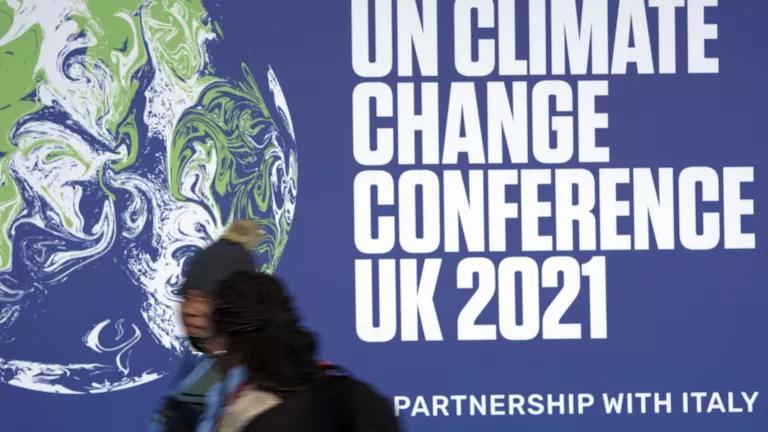
Here’s What’s Happening at COP26

Paris Climate Agreement: Everything You Need to Know
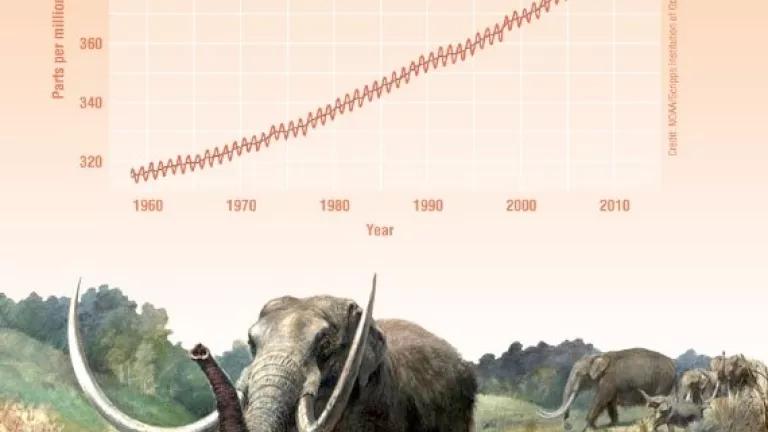
India’s Climate Journey from Paris to Glasgow











